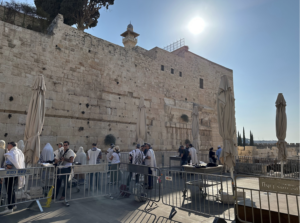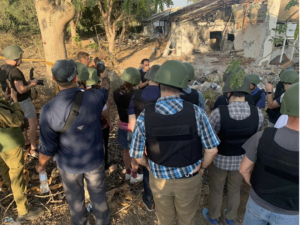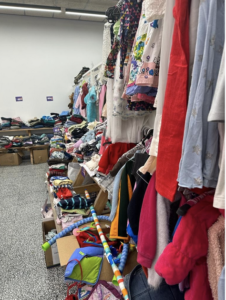Dear WJC Family,
 Shloshim
Shloshim
Wednesday morning, as the sun rose over the Jerusalem ramparts, my twenty-nine traveling companions and I davened (prayed) the morning service at the egalitarian plaza of the Kotel. Leading the services was my colleague from Boulder, Rabbi Marc Soloway. It was his grandmother’s Yahrzeit. After the service, before the final recitation of Mourner’s Kaddish, he paused to tell a little about her. She had died decades before, on a visit from London to family in Jerusalem, so it was particularly poignant for him to be honoring her by leading the davening at the Kotel.
“And Jeff, who are you saying Kaddish for?” Marc suddenly asked. I hadn’t really explained it to anyone before – as a leader at WJC I am usually among those saying the Mourner’s Kaddish, but here, among my colleagues and friends, well they noticed me saying Kaddish. So I explained stammeringly, “Oh, well, my wife Tami and I decided, when we learned how many of the dead from the October 7th attack were complete families and therefore wouldn’t have a kaddishel (someone obligated to say kaddish for them), we vowed that we would observe shloshim for them.”
Shloshim is a period of thirty days after a death, including the seven-day shiva period, with special mourning customs. During the shloshim there is a custom not to shave and all mourners recite Mourner’s Kaddish (for parents one is required to continue for 11-months, but the extended period is only optional for other relatives). If you’ve noticed me looking a bit scruffy lately, that’s why. The truth is I have been grieving like a mourner and the ritual has helped me move through the last four weeks as I get used to a world that looks and feels different than it did on October 6th.
 Darkness
Darkness
As I explained my recitation of Mourner’s Kaddish there at the Kotel on Wednesday morning, I couldn’t help but think of the Kaddish I’d recited 40 hours earlier. Monday afternoon, we were standing among five houses in Kibbutz Be’eri. Over 100 people in the Kibbutz of 1,100 were killed on October 7th. Many were tortured. 10 were kidnapped. The IDF Search and Rescue troops in charge of analysis of the scene toured us through the homes and explained the signs of the horrible atrocities we were looking at: broken glass, bullet holes, burned buildings and bloody knives, as well as teddy bears, skate boards and family photos, all testified to the depravity of the deaths that had occurred there three weeks before. It was the worst, darkest place I have ever been.
There, among the people’s homes turned horror scenes, Cantor Rabbi Luis Cattan of Sutton Place Synagogue recited the El Maleh Rahamim Memorial Prayer for martyrs. It was haunting, but appropriately so. And then all of us, as a group, recited the Mourner’s Kaddish. We were the first civilian group allowed to witness the horrors of that place, and as far as I know, the only one. It is a special privilege to be the ones to recite Mourner’s Kaddish in that spot, and also a special burden.
Light
But as much as I witnessed the remnants of acts on par with the worst tortures our people have ever suffered, all around me were signs of light. Even right there in Be’eri, the young IDF soldiers showing us around were clearly shaken by all they’d witnessed, and yet just like their country, looked determined not to play the role of history’s victims again. Their spirit emitted a special light. There was the ad hoc public blood donation center where I donated a pint. On its first day open, a couple of days after the massacre, people waited 11-12 hours to donate. Over 30,000 units were collected. The place was aglow with the light of mitzvah and Jewish people giving even of their very lifeblood to help others.
 Light is pouring out of the dozens of instantaneous donation and support centers that have popped up in every neighborhood of every city to support the 200,000 displaced Israelis living in hotels all around the country. Can you imagine families of 4 or 6 or 8, living in a hotel room together, without laundry machines or kitchens? These neighborhood groups and the volunteer command centers they are creating (like the one seen at left) are providing families with everything.
Light is pouring out of the dozens of instantaneous donation and support centers that have popped up in every neighborhood of every city to support the 200,000 displaced Israelis living in hotels all around the country. Can you imagine families of 4 or 6 or 8, living in a hotel room together, without laundry machines or kitchens? These neighborhood groups and the volunteer command centers they are creating (like the one seen at left) are providing families with everything.
We met heroes, and I mean real heroes, brave souls who literally put their lives on the line to protect others, strangers, that dark day. Heroes who drove down from Jeruselam into the unknown after getting a call from a friend fleeing the Music Festival. Heroes, civilians, who treated the wounded under gunfire and saved many lives. Heroes who drove the wounded to hospitals in the North, then turned around and went back for more. Heroes who are doing everything they can to rally support for the return of their kidnapped children.
We met them all and bathed in the light of their goodness. Everyone we met had a broken heart just like ours. But there was a wholeness in their commonly shared determination that they may be broken now, but they would not be broken forever. Their determination helped pull me from my victimized stupor. It is everything the State of Israel stands for – it doesn’t mean no Jew will ever be a victim (halavai), but it means the Jewish people will never again be history’s victim.
Sharing Our Light on the day of the Shloshim
This Sunday is the shloshim, the thirtieth day after that dark Shabbat. As we emerge from that official mourning period, hundreds will gather for a concert on Sunday night to benefit the UJA Emergency Fund which is providing millions of dollars in aid to make sure that light keeps shining. To join Neshama Carlebach and her band on Sunday night at WJC you must register here. Neshama and our 28 partner synagogues and organizations are determined to add our light to the combined light of the Jewish people and help to lift us out of the darkness we all feel. If we will be broken, at least we can be whole in sharing our brokenness together.
Shabbat
I will be reflecting more about my trip and answering questions after Kiddish lunch on Saturday at 1pm. This will not be a graphic depiction sort of conversation, though the basics of what happened on October 7th will likely be mentioned. I’d say the content of the discussion is generally appropriate for tweens and up.
Before that, we have lots of ways to join with our community to enjoy the light of Shabbat together. On Friday night, in addition to our regular Shabbat service, there is an ECC Community Shabbat Service. On Saturday morning I hope you will join us for either the exciting inaugural Shabbat Family Service or to hear the wisdom of our Rabbinic Intern Claire Shoyer in the main sanctuary.
See you in shul,
